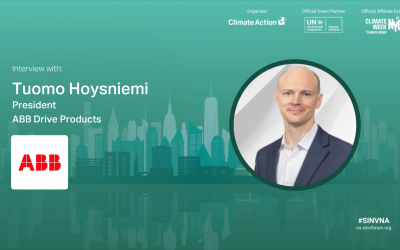Renae Kezar on what Johnson Controls is doing to encourage the decarbonisation of supply chains
Climate Action caught up with Renae Kezar, VP Global Sustainability and Regulatory Affairs at Johnson Controls, to discuss what the company is doing to encourage the decarbonisation of supply chains.

Climate Action caught up with Renae Kezar, VP Global Sustainability and Regulatory Affairs at Johnson Controls, to discuss what the company is doing to encourage the decarbonisation of supply chains.
What role do buildings play in helping the global community achieve their net-zero goals?
We know that decarbonization of buildings needs to be part of the solution for meeting net-zero goals because they are a major component of global emissions. Almost 40% of global CO2 emissions are from the building sector and three quarters of those emissions are attributable to building operations. Smart building technologies already exist today that can put us solidly on the pathway to meeting net zero by 2050.
Johnson Controls is cutting edge when it comes to the technology needed to decarbonize buildings. We implement state of the art building management solutions, install low energy building devices, such as LED lighting and VAV HVAC systems, together with our most advanced energy efficient heat pumps. Our OpenBlue technology platform can drive 50 percent and more in improvement in energy efficiency and corresponding carbon emissions.
What are Johnson Controls decarbonization goals and how are you working to achieve them?
As a smart, building solutions leader, we are committed to achieving net zero carbon for Scope 1 and 2 before 2040, and announced science-based targets for 2030. As we put forward in our new Sustainability Linked Bond, we are committed to absolute emission reductions in 2025 and we think that near-term action is a must. We cannot wait a decade.
With our team of 100,000 employees, Johnson Controls is firmly committed and ready to lead the charge, transitioning to a lower-carbon economy. Johnson Controls is investing 75% of new product development R&D in climate-related innovation to develop sustainable products and services. We are extremely proud and fortunate to be recognized for our efforts in more than 40 prestigious sustainability indexes and to be listed among the 100 most sustainable companies globally.
How is Johnson Controls encouraging the decarbonisation of supply chains?
We are strongly committed to making our supply chains everywhere sustainable. We believe transparency and accountability are critical. Starting this year, we will require suppliers to disclose environmental and social practices though the EcoVadis assessment system as part of our Sustainable Procurement Program. We use the scores to rate sustainability performance on par with other metrics such as quality and service. This helps to drive the dialogue to ensure our suppliers doing their part to meet decarbonization goals.
Another way we are encouraging decarbonization goals in our supply chain is through partnerships and coalitions. Ahead of COP26, we signed on as a founding member of
the First Mover Coalition, where we are making a commitment to purchase near net-zero carbon steel by 2030. We need to work together to make meaningful progress in the more challenging segments for decarbonization.
How can we accelerate climate action on a global scale?
To drive meaningful reductions by the end of this decade, it is crucial for governments and the private sector to come together and to raise our collective effort of ambition.
Trillions in additional investment in carbon cutting technology, projects and services is required to meet the goals of the Paris Climate Accord. Smart regulations can contribute, but experience also shows that sustainable investment instruments help decarbonize sectors that often fall behind on the policy agenda. Taking meaningful government action would not only accelerate private sector investment in buildings, industry, and infrastructure, it would also bring greater accuracy and transparency to corporate emissions data. Clarifying and rigorously defining what constitutes green is among the most critical actions.
Earlier this year, Johnson Controls became one of the first S&P500 industrial companies to publish an integrated sustainable finance framework and issue a Sustainability-Linked Bond. This follows our entry into a sustainability-linked revolving credit facility in 2019 and the issuance of our inaugural green bond in 2020.






